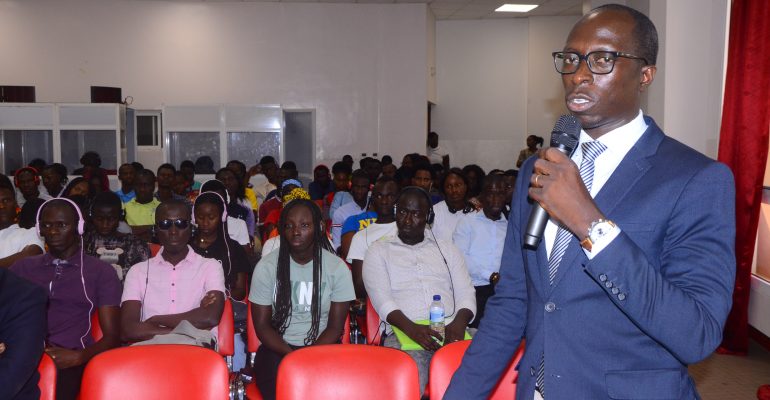ECOWAS Court Vice-President Advocates for Student Engagement in Community Affairs
Justice Gbéri-Bè Ouattara, the Vice-President of the ECOWAS Court of Justice, spoke to students of the Law Faculty at the National School of Administration (ENA), encouraging them to enhance their engagement in community affairs. This message was delivered during a forum designed to raise awareness of the work of the ECOWAS Court of Justice among the faculty members, administration, and students.
Justice Ouattara highlighted the potential for students to secure opportunities within the community institutions, particularly employment prospects at the Court. He cited the career path of Guinea Bissau’s current Minister of Justice and Human Rights, a former judge and president of the ECOWAS Court, as an example of the opportunities available.
The Vice-President elaborated on the campaign’s goals, indicating the Court’s desire to increase its visibility among community citizens. He noted that the Court organizes awareness missions annually in member states, with Benin and Guinea Bissau being this year’s focus.
Justice Ouattara, outlining the duties of the Court, informed participants that as West Africa’s principal legal organ, its primary responsibility was the protection of human rights. He noted that the Court’s mandate, which now allows individuals to present their cases directly to it, was part of the amendments made in 2005 to the Court’s initial 1991 protocol. He encouraged Guinea-Bissau nationals who feel that their rights have been violated to consider seeking recourse within the jurisdiction of the Court.
In his speech, Dr. Alcides Gomes, Rector of the Law Faculty, welcomed the ECOWAS Court of Justice’s initiative to conduct the awareness mission. He underscored the importance of such efforts in educating citizens about the Court’s mandate, activities, and procedures.
Dr. Gomes also expressed a desire for Community documents to be translated into Portuguese. He stressed the need for inclusivity, pointing out the language barriers Portuguese-speaking populations face in understanding the foundational texts and documentation of Community institutions.
A series of presentations were then delivered to expand on the Court’s role, procedures, and mechanisms for case filing and judgment enforcement.
The initial presentation was conducted by Dr. Christopher Nyinevi, who provided an extensive introduction to the Court and its jurisdiction. His presentation, titled “Overview on the Court/Jurisdiction,” aimed to familiarize the participants with the Court’s foundational structure, its legal mandate, and the scope of its authority.
Mrs. Marie Saine presented “Practice and Procedure of the Court”. She delved into the specific steps involved in bringing a case to the Court. Her presentation covered the stages of litigation, from filing a lawsuit to the judgment, and the procedural norms that guide the Court’s operations, ensuring that participants understood the legal process.
The final communication was presented by Mr. Gaye Sowe, who focused on the practicalities of “How to File Cases Before the Court/Enforcement of Its Judgment.” This part of the session addressed two critical areas: the process for individuals and entities to initiate legal action in the Court and the mechanisms in place for the enforcement of the Court’s decisions. Mr. Sowe’s presentation provided clarity on how judgments are implemented and the role of national jurisdictions in enforcing the Court’s decisions.
The forum was part of a broader campaign by the ECOWAS Court to enhance legal awareness among member states’ populations, with a particular focus on the Court’s accessibility and its role in upholding human rights.

